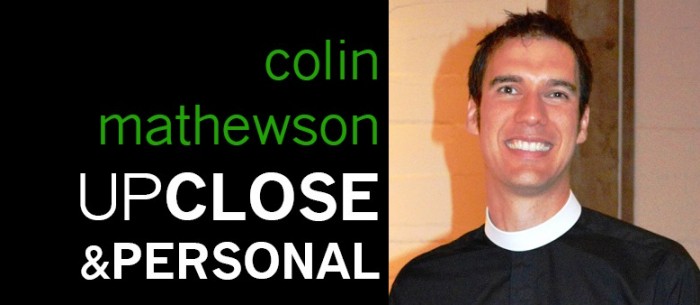Up Close and Personal with Colin Mathewson on Youth

What drew you to working with youth?
My undergraduate honors thesis focused on enhancing youth participation in community decision-making; as part of that research, I put together a summer youth group with young people from several local high schools, and connected them with elected officials. It was an important learning experience for all involved, including, and especially, myself. I think the youth came away with a greater sense of possible influence on the world around them, the elected officials were invited to reconsider the part young people can play in community development, and I realized just how difficult it can be to keep a youth group going week after week! I continue to be fascinated by this time in a person’s life: so much is changing, so much is new, so much seems pressing and essential.
How long have you been in your current role?
I’ve served as a deacon and a priest at St. Paul’s Cathedral for eighteen months, and have been tasked primarily with our Latino, young adult, outreach, and, more recently, our children, youth, and family ministries.
How do you view youth ministry? (metaphor?)
I don’t think youth ministry is fundamentally different than ministry with a different demographic. People want you to listen, to walk with them, to get to know them and support them as they continue figuring how they fit in this world. We all need to be reminded all the time that God is with us and God loves us no matter what! I view all ministry through the metaphor of gardening: I try to prepare well the soil of ministry work, plant seeds of ideas where I can, cultivate their growth with all the care I can muster, and celebrate together the fruits that have been made possible with the help of God.
Tell us about your youth program.
The Cathedral has had a dedicated group of about ten high school students for some time, although it’s grown a bit recently. They meet once a month on a relatively informal basis, and see each other at church every Sunday morning. Every fifth Sunday is Youth Sunday, which means youth serve as acolytes, ushers, thurifers, and even sometimes preachers!
What is your greatest joy/favorite part of youth ministry?
I love the challenge of teaching young people — it forces me to stop using technical jargon I learned in seminary, and instead speak in direct, authentic ways. Many young people (including myself), are quite skeptical of the world around them, which raises the truth-telling bar even higher when communicating.
Anything else you’d like to share with the diocese?
There’s is so much more room for our young people to grow across the diocese — let’s begin to plan and work together better between churches so that our youth ministries may flourish in the time ahead!